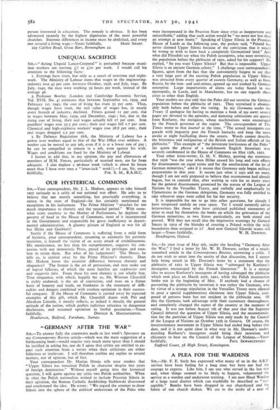OUR HYSTERICAL COMMONS _
Sni,—Your correspondent, Mr. J. L. Hodson, appears to take himself very seriously as a critic of our national war effort. He asks us to believe that not merely something, but practically everything, is rotten in the state of England—he has certainly mentioned no exceptions in his indictment. The Prime Minister " attaches far too much importance to rhetoric and the rounded period." With some- what scant courtesy to the Mother of Parliaments, he deplores the poverty of head in the House of Commons, most of it incorporated in the Government and responsible for grave inefficiency in depart- mental administration. A gloomy picture of England at war for all but Hitler and Goebbels!
Surely if the House of Commons is suffering from a mild form of hysteria, your correspondent, assuming as axiomatic his patriotic intention, is himself the victim of an acute attack of atrabiliousness. His omniscience, no less than his outspokenness, suggests his con- nexion with our democratic Press, proud of its privileges and reso- lute to retain them. But what of his judgement? The House, he tells us, is carried away by the Prime Minister's rhetoric. Does Mr. Hodson know the essential difference between rhetoric and eloquence? The former is the art of persuasion, and may make use of logical fallacies, of which the most familiar are suppressio veri and suggestio falsi. From these his own rhetoric is not wholly free. True eloquence, with which, happily for us, Mr. Winston Churchill is richly endowed, is the art of conviction, and rests on a firmer basis of honesty and truth, on frankness in the statement of diffi- culties and dangers combined with resolute optimism in their success- ful conquest. If the House of Commons is carried away by repeated examples of this gift, which Mr. Churchill shares with Pitt and Abraham Lincoln, it merely reflects, as indeed it should, the general attitude of the nation, which prefers judicious reticence to dangerous disclosures, and reasoned optimism to fretful pessimism.—Yours






























 Previous page
Previous page